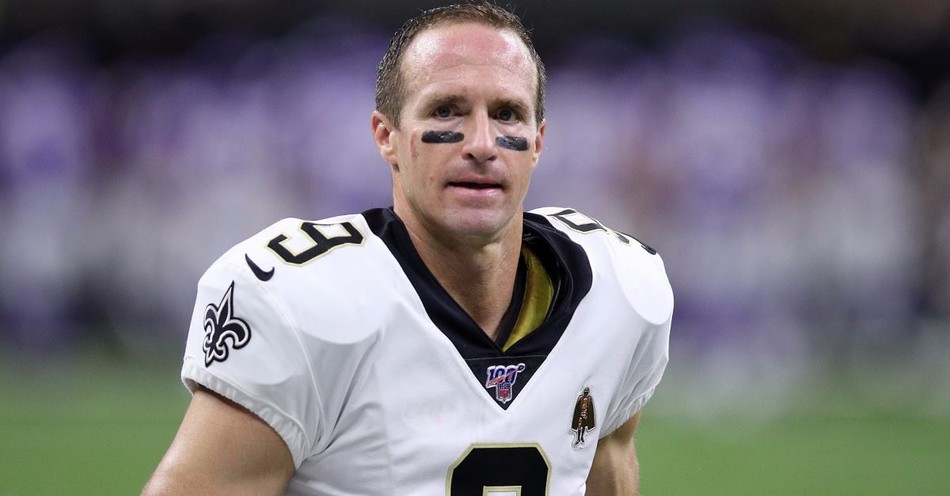“Controversy erupts around Drew Brees,” proclaimed news outlets on Friday, the very same news outlets who erupted the controversy engulfing one of the NFL’s best quarterbacks.
Here’s the story: In a short video, Brees encouraged students to participate in Focus on the Family’s “Bring Your Bible to School” project. He never once mentioned anything about sexual orientation or gender identity since, well, that’s not what Bring Your Bible to School Day is all about. To my knowledge, Brees has never spoken publicly on LGBTQ issues. He really didn’t clarify his views even on Friday, when he was forced to respond to the “erupting controversy.”
Perhaps Brees hasn’t talked much about LGBTQ issues because, well, he’s a football player, and that’s not what football is about. Or perhaps he’s realized, as a public figure who is also a Christian, what would happen if his views were revealed as anything less than a full-throated endorsement of the new sexual orthodoxy.
Either way, Brees seemed honestly surprised by his presumed guilt simply because of a connection to this Focus on the Family project. That in and of itself is a lesson for all of us.
Theologian N.T. Wright suggests that Christians need to ask the question “What time is it?” meaning that Christians should understand where they are in redemptive history – within the overarching historical framework the Scriptures present from the creation to the new creation. I’d add that Christians should also ask the question “What time is it?” also in regard to what cultural moment do we live in? What is being asked and expected of people of faith now, in this time and in this place?
Friday’s Washington Post article on Drew Brees is a case in point. Widely assumed by many, especially by Allyson Chiu in the Washington Post piece, is that even associating with anyone who holds less-than-affirming views on LGBTQ issues is no longer acceptable, even if the association is completely unrelated to LGBTQ issues in any way. No argument was offered by Chiu or any other critic as to why this is now the case. It was almost as if no argument was necessary.
That’s more than a little frustrating, because as one blogger noted recently, any movement that spends years trying to shut down a Denver bakery and discredit a chicken sandwich restaurant is a movement that has, long ago, run out of real injustices to fight. This second-degree-of-separation guilt-by-association campaign against Brees indicates that the gatekeepers of the LGBTQ movement have moved on, and are now demanding that everything, and I mean everything—from football to business to education to politics to Stranger Things—has to be about this.
As Focus on the Family Jim Daly demonstrated so well in his response to this nonsense, Christians should resist the demand to frame every issue of life and culture around LGBTQ issues. There’s so much more to life than this.
It’s strange that Christians are constantly being asked why we spend so much time talking about sex. But we aren’t the ones turning reality upside down, making this the one issue that every other issue has to be about.
On the other hand, as Mr. Brees found out, we won’t always be able to sit this one out. If you are even perceived as being on the “wrong side of history,” it may not matter how nice you are. That means that in this time and in this place, we’ll have to be ready to speak to those issues when appropriate or unavoidable.
Christians, what time is it? It’s post-sexual revolution, a time in human history in which nearly everything about life and our life together, from our understanding of right and wrong to our understanding of what it means to be human, has been reimagined along the lines of sexuality.
If you were Drew Brees, targeted because of a completely unrelated story about your opinion on homosexuality or gender, what would you say? Too many Christians are unprepared for the tough questions that, like it or not, are inevitable in this time and this place.
But there are answers. And last week, the Colson Center launched a new video series to help. It’s called “What Would You Say?” and it provides understandable, repeatable, and convincing answers to the hardest cultural questions.
New videos will be posted every week at WhatWouldYouSay.org.
BreakPoint is a program of the Colson Center for Christian Worldview. BreakPoint commentaries offer incisive content people can't find anywhere else; content that cuts through the fog of relativism and the news cycle with truth and compassion. Founded by Chuck Colson (1931 – 2012) in 1991 as a daily radio broadcast, BreakPoint provides a Christian perspective on today's news and trends. Today, you can get it in written and a variety of audio formats: on the web, the radio, or your favorite podcast app on the go.
John Stonestreet is President of the Colson Center for Christian Worldview, and radio host of BreakPoint, a daily national radio program providing thought-provoking commentaries on current events and life issues from a biblical worldview. John holds degrees from Trinity Evangelical Divinity School (IL) and Bryan College (TN), and is the co-author of Making Sense of Your World: A Biblical Worldview.
Publication date: September 9, 2019
Photo courtesy: Getty Images/Chris Graythen/Staff




